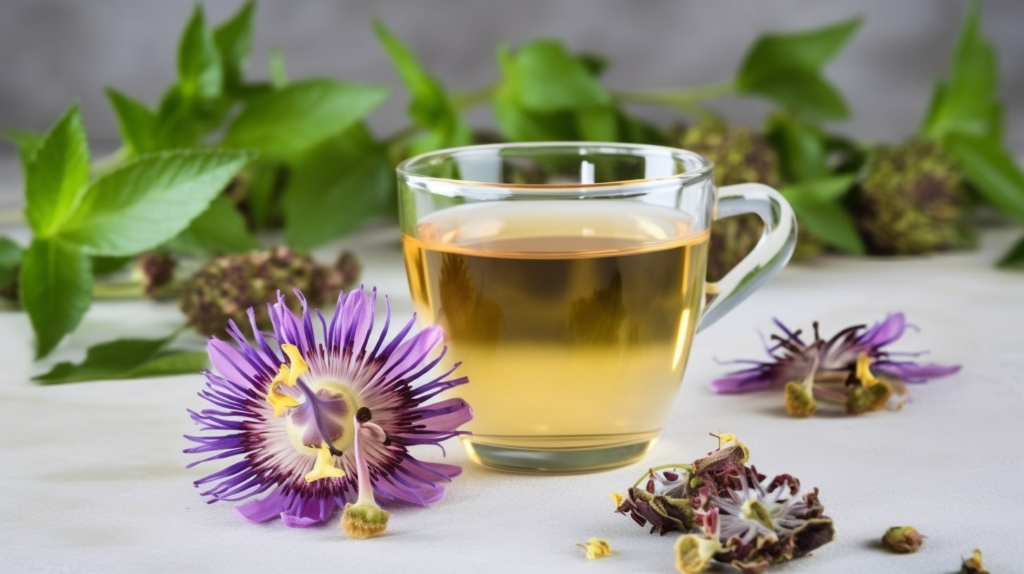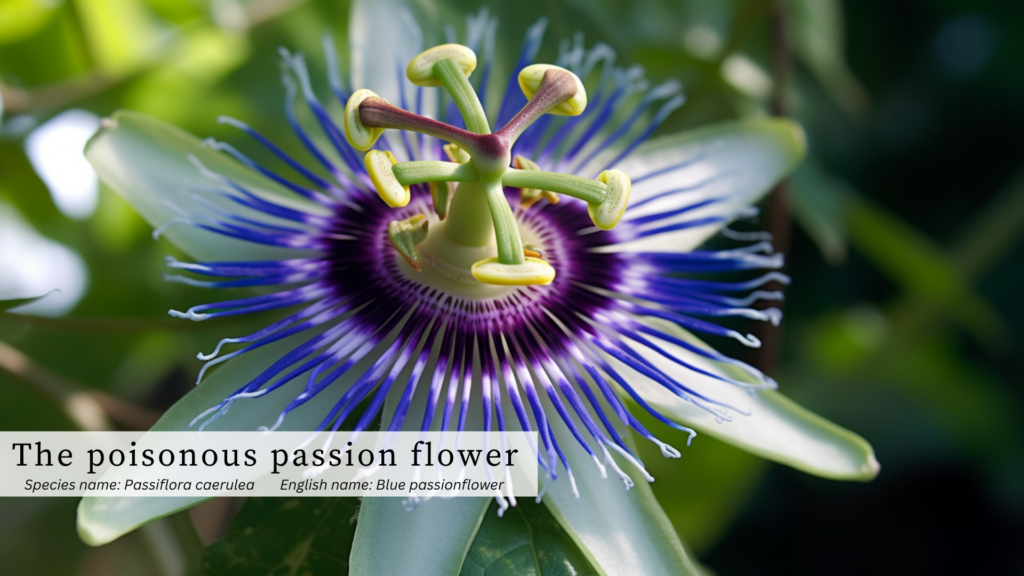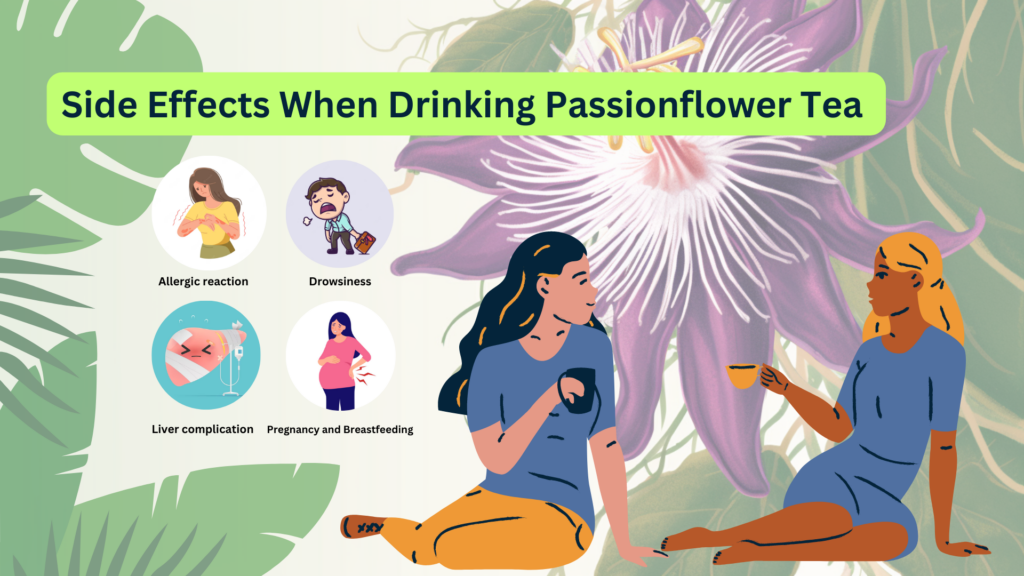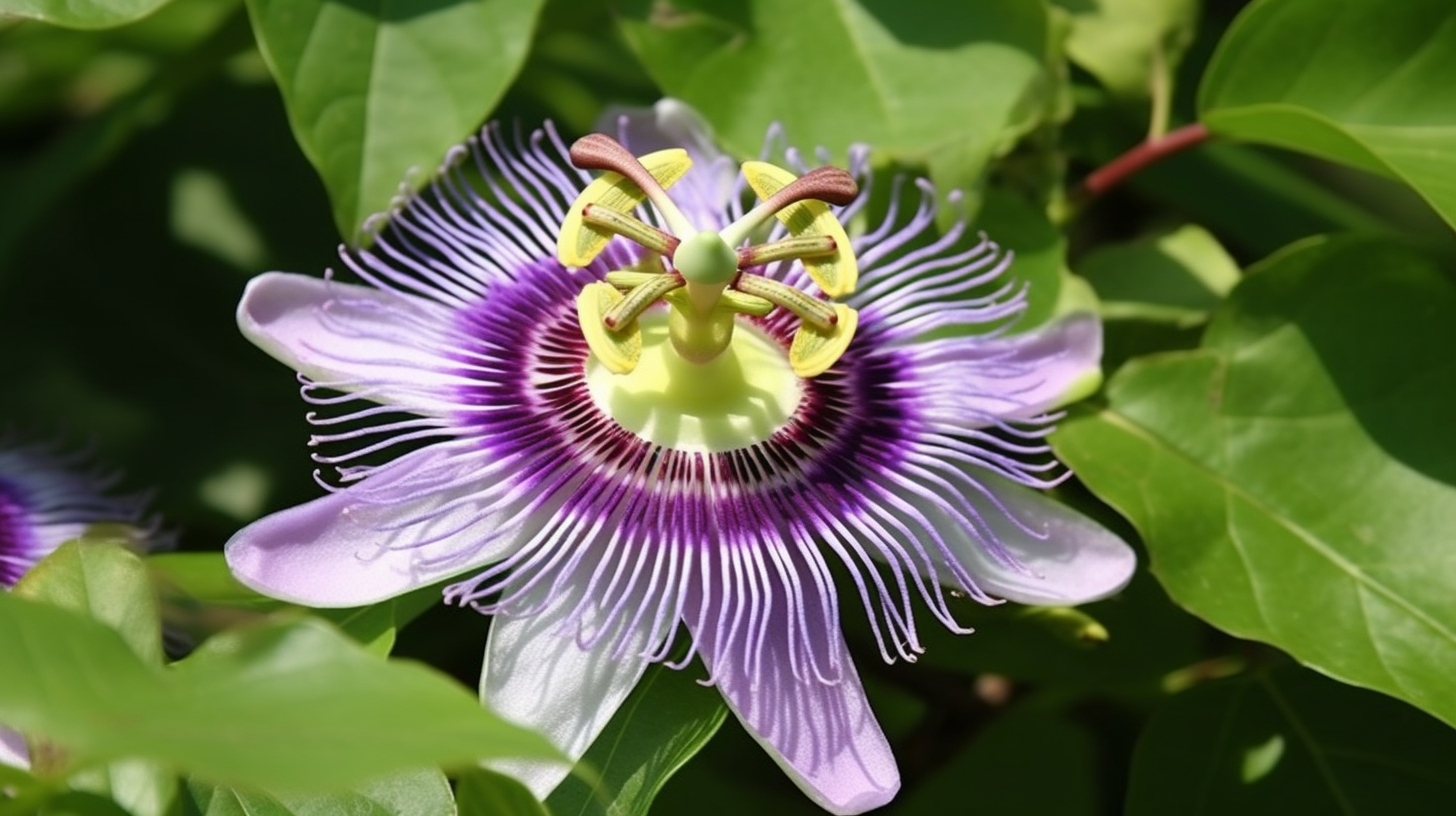What is passionflower tea good for, you may ask? Amid the humdrum of our busy lives, we often seek natural remedies that can provide a soothing effect and promote overall well-being. Passionflower tea, a delightful brew derived from the Passiflora incarnata plant, is one such solution that is garnering widespread recognition. 1
With an alluring grassy taste and a myriad of potential health benefits from anxiety relief to sleep enhancement, it’s no wonder this tranquil tea is fast becoming a favourite among Australians. So, dive with us into this comprehensive exploration of passionflower tea’s astonishing potential and how it could revolutionise your daily wellness routine.
Table of Contents

What is Passionflower Tea?
Passionflower also known as Passiflora incarnata, a mesmerising climbing vine known for its intricate beauty and medicinal properties, traces its roots to the southeastern United States, Central, and South America. Known for its naturally calming effects, native tribes across the Americas harnessed the plant as a sedative, an application that caught the attention of Spanish explorers during the 16th century.
As the allure of the plant’s mystical appearance and therapeutic benefits spread, it was subsequently transported to Europe, where it not only flourished in cultivation but also found a place in European folk medicine.
The historical connection between passionflower and various traditional healing practices underscores its enduring significance. Sixteenth-century Spanish explorers were particularly captivated by the indigenous usage of the vine and actively propagated its cultivation across Europe.
Over time, the plant’s fame grew, and it became a staple in gardens and apothecaries throughout the continent. It came to symbolise not only exotic beauty but also a natural means of alleviating various ailments, bridging the cultural divide between the New World and the Old World. 2

In modern times, the passionflower has transcended its aesthetic appeal to become a popular dietary supplement. Its applications have evolved to include treatments for a broad range of conditions such as anxiety, sleep disorders, pain, heart rhythm disturbances, menopausal symptoms, and attention-deficit hyperactivity disorder (ADHD).
The systematic review’s findings regarding Passionflower’s efficacy in treating ADHD symptoms are modest but promising. However, the limited number of Remote Control Trials (RCTs) and the low level of evidence means that no specific recommendations for use can be made yet. 3
The area of herbal medicines in ADHD treatment is still burgeoning, and Passionflower’s role requires more rigorous investigation. As scientific research continues to explore this exciting field, Passionflower’s potential in alleviating ADHD symptoms may become more concrete. 3
Furthermore, topical applications of passionflower extend its healing properties to burns and hemorrhoids. The passionflower’s journey from the wilds of the Americas to the pharmacies and gardens worldwide is a testament to its versatility and the timeless human quest for natural remedies and beauty.
Useful Parts of the Passion Flower Plant
So, what part of the passion flower is used for tea? It’s not just only the flower, almost every part of the plant can be able to use it! Passionflower tea is made from the dried leaves, flowers, and stems of the plant.
This flower’s unique taste has made it a favourite among herbal tea enthusiasts seeking a calming beverage with therapeutic benefits that many describe as mild and calming. It is often lauded for its potential health benefits, which are derived from the various flavonoids and plant compounds present in the passionflower plant.
Something to keep in mind is that there are passionflower lookalikes, so if your intention is to forage for your own wildcrafted ingredients, be very careful.
With more than 450-500 species in the passionflower genus of mostly tendril-bearing vines in the family Passifloraceae and their characteristic flower, it can be quite easy to make an honest, yet very dangerous mistake. 2 4
Passiflora caerulea or blue passionflower looks a lot like Passiflora incarnate to the untrained eye, but it can be very harmful. Its leaves and unripe fruit contain cyanogenic glycosides which turn into cyanide when eaten and can cause nausea and vomiting in humans and animals. The leaves contain cyanide in an inactive form, bound to sugars as cyanogenic glycosides, making it harmless. However, the leaves also have enzymes that can interact with these glycosides. When they combine, the sugars break down, releasing the poisonous cyanide. 5 10

When it comes to finding the right tea for our ‘What is passionflower tea good for’ mission, this is why we choose to leave the experts like HerbiTea in charge.
Some drinkers might detect a hint of sweetness, while others may find it slightly astringent or bitter, depending on the preparation and the specific variety of passionflower used.
This is another reason to avoid choosing to go out into the wild and pick your own passionflower is that the previously mentioned toxic lookalike, Passiflora caerulea, has a bitter taste. The ripe flesh of the fruit is bland but edible and is likely to contain toxins at trace levels. Mistaking this bitter taste for how your palette responds to safe and consumable varieties of passionflower could be misleading. 5
So, let’s get back to the ‘what is passionflower tea good for’ discussion and consider what it may be good for.
What is Passionflower Tea Good For?
As you would no doubt agree, the history of this plant and its use are fascinating. But like with anything that can be introduced to a routine change, responsible support should be sought from a suitably qualified professional. Let’s explore the passion flower tea benefits and side effects.

Health Benefits of Passionflower Tea
In our fast-paced modern world, moments of serenity and balance are treasured commodities. Did you know that drinking passionflower tea, your new secret weapon in fostering relaxation and tranquillity, may have more to offer than meets the eye?
Here are some of the benefits and why this delightful infusion is considered a must-have in many people’s daily routine that will help with the detail behind “What is passionflower tea good for?”
- Natural Stress Reliever
- Passionflower tea is renowned for its potential calming properties. It contains apigenin, a bioflavonoid that may stimulate the production of a neurotransmitter called gamma-aminobutyric acid (GABA) in the brain. GABA helps reduce excessive brain activity and induce relaxation, turning your tea time into a peaceful retreat. Same as the Valerian root, it is known to cause a dose-dependent release of neurotransmitters and also inhibits the enzyme-induced breakdown of GABA in the brain. 1 12
- Anxiety passionflower for sleep
- Struggling with a restless night? The answer may lie in a cup of passionflower tea. Studies have suggested it could assist in improving the length and quality of sleep, ensuring you wake refreshed and ready to tackle the day. 1
- May Support Heart Health
- The flavonoids present in passionflower tea could potentially contribute to maintaining healthy blood pressure. Sip your way to wellness while cherishing each soothing cup. 6
- Natural Antioxidant Source
- The aqueous extract of its leaves is a potent source of antioxidants, those protective compounds that help your body defend against harmful free radicals. In turn, this helps to support overall well-being and longevity. 2
- May help with the symptoms of menopause
- Passion Flower offers pain relief, spasm reduction, and sleep-enhancing properties, traditionally aiding in neural pain, epilepsy, and spasms. The link between reduced serotonin and menopausal symptoms is established. While research on antidepressants’ impact on these symptoms, especially vasomotor ones, is ongoing, Passion Flower can alleviate menopausal symptoms like vasomotor disturbances, mood shifts, and sleep issues. It’s a potential alternative for those who can’t undergo hormone therapy, addressing various menopause-related symptoms. 7
- Passionflower benefits for skin
- Species of Passionflower are commonly found throughout the world. Researchers have identified it has potential application in the areas of treating inflammation, and microbial issues, and possesses antitumour and anti-oxidant properties. Passion flower products have been studied with regard to their effect on sinus irritations, asthma, skin rashes, and vasculitis, however, more in-depth research is required. Researchers proposed that some of the noted reactions were likely a result of impurities in combination products, and not by passionflower itself. 11
A Natural Approach; Passion Flower for Anxiety
Anecdotal stories of relief and well-being can offer much-needed hope for those searching for natural treatments for their ailments. The following are firsthand accounts that serve as ”Passion Flower for Anxiety Reviews,” illustrating the profound impact of this natural remedy on individuals struggling with anxiety and insomnia. 8
One user, age 25-34, shares, “This is by far, the best treatment I have come across for anxiety.” A 65-74-year-old echoes the sentiment, stating, “This was recommended by a friend…never thought it would work so well. Can hardly open my eyes 10 minutes after taking a few droppers of the liquid.” Not only does it seem to answer the question, “What is passionflower tea good for?” but it also provides further reviews and actual experiences they have been through of its effectiveness in a variety of forms.
Further tales of relief come from all age groups. A young mother of two found it as a lifeline during her anxiety attacks, while a senior user in their mid-70s found its potential as a sleep aid helpful.
Various other users praised its effectiveness in managing their anxiety symptoms and promoting healthier sleep patterns. “Works amazing for my debilitating panic attacks. I take it every night and have told everyone I know about it,” shares one user, while another advocated, “Just finished seven months using passion flower twice a day for fatigue and insomnia. VERY good supplement, the best one I’ve ever been on.”
From panic attacks to sleepless nights, the use of passion flowers, specifically in the form of tea, has emerged as a potent remedy. These accounts underscore the importance of considering natural alternatives like passionflower tea in managing mental health challenges, showing the transformative potential of nature’s gifts.
Studies into Passionflower Tea Benefits
Emerging research is now shedding light on the question ”What is passionflower tea good for” and exploring its potential in managing anxiety. In recent clinical trials, passionflower exhibited promising effects in reducing stress and anxiety levels. 1 6
This could be especially beneficial for those grappling with disorders like Generalised Anxiety Disorder (GAD), with one study showing particular promise.1
Further investigation also revealed passionflower’s potential in managing sleep disorders. Researchers have extensively studied the effectiveness of passionflower in treating insomnia. Passionflower extract, along with other herbal extracts, was administered under a controlled study with patients diagnosed with bipolar disorder who also struggled with sleeping. At the end of the study, patients were found to have improved sleep quality and reduced symptoms of insomnia. 6
Chronic insomnia sufferers, whose conditions are often linked with anxiety and stress, responded positively to the administration of passionflower. The plant’s sedative action showed a potential therapeutic effect, suggesting it may aid those struggling with sleep initiation. 9
Passionflower Side Effects
Now, I appreciate that you are here to find the answer to ”What is passionflower tea good for” but there are other considerations to remember. 10

Although passionflower tea is generally considered safe for most people, it is important to keep in mind that passionflower tea may bring with it side effects or adverse reactions. Here are some points to consider about passionflower tea side effects:
- Drowsiness
- One of the primary effects of passionflower tea is its potential to induce a state of calm or relaxation. For some individuals, this might translate into drowsiness or decreased alertness. It is advised not to consume passionflower tea before driving or operating heavy machinery until you know how it affects you. 1
- Allergic Reactions
- Although rare, some individuals may be allergic to passionflower and could experience symptoms like itching, rashes, shortness of breath or nausea. If you notice any adverse reactions after consuming passionflower tea, discontinue its use and seek medical attention promptly. 11
- Surgery
- Passion flowers might slow down the nervous system. Care needs to be taken when using passionflower in conjunction with anesthesia and other medications as they might slow down the nervous system too much.1
- Pregnancy and Breastfeeding
- Gastrointestinal Issues
- Liver function
- Although rare, and the hearsay “Herbal teas and supplements can definitively lead to liver injury and even liver failure” and despite widescale use, passionflower extracts have not been convincingly linked to instances of clinically apparent liver injury. However, there have been no placebo-controlled and adequate-sized trials with a careful prospective assessment of adverse events and effects on laboratory test results. Passionflower has not been implicated in causing serum enzyme elevations or clinically apparent liver injury. 5
Side effects of Passionflower
Simple Ways to Use Passion Flower
Right at the top of the list of ways to use this gift from Nature for many people is tea. It can also be used as a tincture and essential oil to name a few. However, passionflower on its own in a calming tea is one thing. When combined with other calming herbs and roots such as Chamomile and Valerian, you’ve got a Sleepy Tea like no other! The HerbiTea Team source the best ingredients possible for their bespoke blends including their Sleepy Tea blend. 12
Passionflower Tea recipe:
Ingredients
- Approximately 2 grams or 1 tablespoon of dried passionflower, alternatively a tea bag can be used
- One cup of hot, almost boiling water
- An optional dash of honey for sweetening
Method:
- Submerge the dried passionflower in the hot water, allowing it to steep for 6-8 minutes. If you prefer a more robust tea and seek to enhance its potential benefits, extend the steeping period to 10-15 minutes.
- Once the steeping time is up, strain the tea or remove the tea bag. If desired, sweeten with a hint of honey to taste.
- Recommended Consumption: Consume a cup of tea prepared with 1 tablespoon of dried passionflower every evening for a minimum of one week to observe the calming effects.
Serving: Drink one cup of tea made with 1 tablespoon of dried passionflower per night for at least seven days to experience the calming effects.
Passionflower vs Chamomile
Wait. What? Chamomile? I thought we were looking at ”What is passionflower tea good for”? You’re right. We are! But there’s something about this duo that needs to be considered.
Passionflower tea and chamomile tea, both known for their calming effects, originate from different plant species. The passionflower is a vine species native to the southeastern United States, Central, and South America while chamomile refers to daisy-like plants common in Europe and Western Asia.
Their chemical compositions also differ. Passionflower contains flavonoids, alkaloids, and phenols with potential anxiety-relieving properties, while chamomile is rich in terpenoids and flavonoids that are believed to have sedative and anti-anxiety effects.
Health benefits for both teas include sedation and potential help with sleep and digestion. Taste-wise, chamomile carries hints of apple or honey, whereas passionflower might have a grassier or earthier aftertaste. Join us on a deeper dive into passionflower vs chamomile.
FAQs
Can you drink Passionflower tea every day?
Passionflower tea can generally be consumed every day. It is often used for its calming and sedative properties, particularly to aid in sleep and alleviate stress or anxiety. It is responsible to seek advice from a trusted specialist before making this a consistent part of your routine.
Who should not drink Passionflower tea?
Certain individuals should be cautious with or avoid Passionflower tea, including pregnant women, as it may stimulate the uterus. Nursing mothers and those on specific medications, such as sedatives or blood thinners, should also consult with healthcare providers due to potential interactions. Children and individuals with specific health conditions like liver disease might need to avoid Passionflower as well.
How does Passionflower make you feel?
Passionflower, known for its calming properties, is often used to alleviate symptoms of anxiety and insomnia. It contains compounds that may boost the levels of gamma-aminobutyric acid (GABA) in the brain, helping to reduce brain activity and promote relaxation.
People who consume Passionflower, especially as a tea, often report feelings of calmness and a reduction in stress-related symptoms. Its mild sedative effect can also assist in promoting a good night’s sleep.
How much Passionflower tea can I drink?
Depending upon advice from your specialist, this can vary. Many people suggest that drinking one cup of tea made with 1 tablespoon of dried passionflower per night for at least seven days can help with experiencing the calming effects.
Conclusion
In conclusion, Passionflower tea, native to the southeastern United States and now found blooming globally, provides a gentle cuppa with potential health benefits and a touch of tranquillity. This herbal brew, with its calming grassy tones, offers an impressive range of benefits, including relief from stress, improved sleep quality, potential heart health support, and an antioxidant boost. It even holds a special place in heart health and digestion.
However, while passionflower tea is generally safe to sip, it’s critical to remember that everyone may react differently. Some may experience mild drowsiness, while others could have allergic reactions or gastrointestinal issues. It’s also vital to consider potential interactions with medications and their suitability during pregnancy and breastfeeding.
When compared with chamomile tea, another popular bedtime brew, the two offer similar calming benefits, yet they boast different taste profiles and plant compounds. Chamomile tea tends to have a honey-like sweetness, while passionflower offers a unique earthy taste.

Whether you’re trying to unwind after a busy day or are looking to boost your overall well-being, passionflower tea might be the brew for you, mate. But remember, we’re all unique, so it’s about finding what works best for you individually.
Join the conversation about passionflower tea and share your thoughts with us on Instagram and Pinterest. And while you’re at it, why not delve into the fascinating world of herbal teas? If you’ve ever wondered, “What is passionflower tea good for?” well, we’d love to hear your insights or experiences! Let’s brew up some knowledge together.
References
- “Benefits of passionflower for anxiety and insomnia ” – A. Stinson, D. R. Wilson, 23 November 2018 [Medcial News Today] [Archive] ↩︎
- “Antioxidant activity of aqueous extract of passion fruit (Passiflora edulis) leaves: In vitro and in vivo study” – J. da Silva, C. Cazarin, T. Colomeu, Â. Batista, L. Meletti, J. Paschoal, S. Júnior, M. Furlan, F. Reyes Reyes, F. Augusto, M. Maróstica Júnior, R. Zollner, 17 January 2013 [Science Direct] [Archive] ↩︎
- “Herbal medicines in children with attention deficit hyperactivity disorder (ADHD): A systematic review” – D. Anheyer, R. Lauche, D. Schumann, G. Dobos, H. Cramer, 26 November 2016 [Science Direct] [Archive] ↩︎
- “Passionflower – LiverTox” – National Library of Medicine Staff, 28 March 2020 [National Library of Medicine] [Archive] ↩︎
- “Blue passionflower (Passiflora caerulea)” – NSW Staff, Reviewed 2020 [NSW WeedWise] [Archive] ↩︎
- “What Is Passionflower Tea Good for and Are There Any Side Effects?” – M. Juber, 1 November 2022 [MedicineNet] [Archive] ↩︎
- “Passiflora incarnata in Neuropsychiatric Disorders – A Systematic Review” – K. Janda, K. Wojtkowska, K. Jakubczyk, J. Antoniewicz, K. Skonieczna-Żydecka, 19 December 2020 [National Library of Medicine] [Archive] ↩︎
- “User Reviews For Passionflower” – Web MD Staff, Last checked 4 August 2023 [WebMD] [Archive] ↩︎
- “Passionflower” – NCCIH Staff, Last checked 7 August 2023 [National Center for Complementary and Integrative Health] [Archive] ↩︎
- “PA comparative study on the effects of Hypericum Perforatum and passion flower on the menopausal symptoms of women referring to Isfahan city health care centers” – F. Fahami, Z. Asali, A. Aslani, N. Fathizadeh, 19 July 2010 [PubMed] [Archive] ↩︎
- “Pharmacological studies on Passiflora sp. and their bioactive compounds” – A. G. Ingale, A. U. Hivrale, 12 April 2010 [African Journal of Plant Science] [Archive] ↩︎
- “Nutraceuticals (Second Edition): Chapter 16 – Role of nutraceuticals as adaptogens” – A. Ray, K. Gulati, S. Rehman, N. Rai, R. Anand, 29 January 2021 [Science Direct] [Archive] ↩︎
Last Updated on 3 months by D&C Editorial Team


